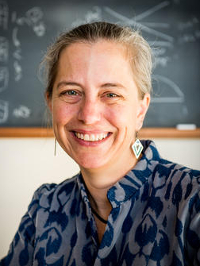NIMBioS Seminar Series
In conjunction with the interdisciplinary activities of the National Institute for Mathematical and Biological Synthesis (NIMBioS), a seminar series on topics in mathematical biology will be hosted at NIMBioS every other Tuesday at 3:30 p.m. (unless otherwise noted) in the Hallam Auditorium, Room 206, Claxton Building, 1122 Volunteer Blvd. Seminar speakers will focus on their research initiatives at the interface of mathematics and many areas of the life sciences. Light refreshments will be served in Room 205 beginning 30 minutes before each talk. Faculty and students from across the UT community are welcome to join us.
Speaker: Dr. Elizabeth Borer, Ecology, Evolution, and Behavior, Univ. of Minnesota; NIMBioS Postdoctoral Fellows Invited Distinguished Visitor
Time/Date: Tuesday, September 26, 2017, 3:30*
Location: Room 206, Claxton Building, 1122 Volunteer Blvd.
Topic: Tools to predict future Earth: Using theory and experiments to guide expectations for the future of the world's grasslands
Abstract:
Among the greatest current challenges for ecology is understanding the links between biodiversity and ecosystem function, on one hand, and global-scale changes to nutrient cycles and species distributions, on the other. While these grand challenges are global in scale, such ecological experiments and sampling must be done at local scales. Distributed experimental networks, in which scientists around the world collaboratively replicate an experiment under many environmental conditions, are one tool with the potential to bridge the gap between site-scale experiments and global-scale predictions. Hypotheses generated from mathematical theory can serve as a logical guide in analyzing and interpreting data from sites around the world, providing insights into widespread responses and those that are context-dependent. By using theory to guide expectations, the Nutrient Network, a decade-long experiment being replicated at >100 sites around the world, has demonstrated that species diversity promotes ecosystem productivity and stability, and that nutrient supply and herbivory control diversity via changes in species composition, including invasions of non-native species and extinction of native species. I will discuss my experience of implementing a distributed network of identically-replicated grassland experiments motivated to build on ecological theory and will present some of the Nutrient Network's recent insights into the controls of diversity and function in the world's grassland ecosystems.
Elizabeth Borer is a professor in the University of Minnesota's Ecology, Evolution, and Behavior Department. Her research focuses on quantifying how global changes, including atmospheric pollution and species invasions and extinctions, are changing the function of the world's ecosystems. Most of her work is in grasslands where she studies the effects of these human changes on global biodiversity, disease transmission, and the identity and function of microbes inhabiting individuals (the "microbiome"). SiTools to predict future Earth: Using theory and experiments to guide expectations for the future of the world's grasslands, Borer has been co-lead of the Nutrient Network, a global scientific cooperative of scientists performing identically replicated experiments at >100 sites in 25 countries spanning 6 continents to study the effects of global changes on critical processes and functions in the world's grasslands. She has published over 90 peer-reviewed publications, including several papers in Science and Nature, and she serves on the editorial boards of two journals. She also is active in the National Science Foundation Long-Term Ecological Research program and regularly serves on national and international scientific panels. Borer is a Leopold Leadership fellow and received the 2015 Alphonse J. Pauchon Foundation Betterment of Mankind award.
*Join us for refreshments at 3 p.m.
Seminar Flyer (pdf)
![]() Watch seminar online.
This seminar was streamed live. Live-streamed seminars are archived for later viewing on NIMBioS' YouTube channel.
Watch seminar online.
This seminar was streamed live. Live-streamed seminars are archived for later viewing on NIMBioS' YouTube channel.
For more information about this and other NIMBioS Seminars, visit /seminars.
NIMBioS
1122 Volunteer Blvd., Suite 106
University of Tennessee
Knoxville,
TN 37996-3410
PH: (865) 974-9334
FAX: (865) 974-9461
Contact NIMBioS



